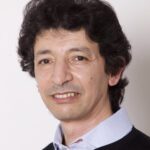Lien vers Pubmed [PMID] – 21106181
Lien DOI – 10.1051/medsci/20102611981
Med Sci (Paris) 2010 Nov; 26(11): 981-5
Because of its high prevalence and social impact, hearing impairment is a major public health problem. Whatever the cause–heredity, acoustic trauma, aminoglycoside antibiotics, noise exposure or aging–the hearing impairment is often caused by an irreversible loss of sensory hair cells. So far, hearing aids and cochlear implants are the only possibility to “treat” profound deafness. With the advent of regenerative medicine, extensive studies aimed to repair, regenerate or replace lost hair cells have been initiated. Recently, Stefan Heller and colleagues described a guidance protocol to induce mouse embryonic stem cells (ESC) and induced pluripotent stem cells (iPSC) to differentiate into mechanosensitive hair cells. The resulting hair cells hold promise as a tool for hair cell molecular physiology and physiopathology, drug discovery, and possibly also hair cell replacement. The next challenges, alternative strategies, their limitations and prospects are also discussed.


